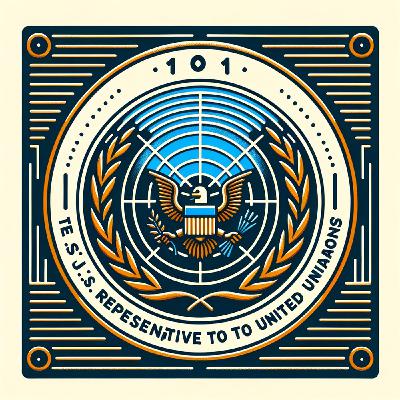Elise Stefanik's Controversial UN Appointment Sparks Diplomatic Tensions
Update: 2025-09-28
Description
In recent days Elise Stefanik, the newly appointed United States Representative to the United Nations under President Trump, has quickly become a prominent figure in both Washington and international diplomatic circles. According to The Business Standard, Donald Trump selected Stefanik for this key ambassadorial role due to her strong criticisms of multilateral institutions, particularly as she has previously described the United Nations as a cesspool of antisemitism in light of its condemnation of civilian deaths in Gaza. This appointment came alongside other pro-Israel selections in the administration, signaling a shift toward a more assertive United States posture at the global body and stirring controversy among domestic and international observers.
Muslim and Arab American leaders, many of whom pivoted to support Trump in hopes of fresh policies on the Middle East, have voiced disappointment over Stefanik's nomination and the overall direction of the new administration. Several grassroots organizers felt misled after campaign promises suggesting a more peacemaking stance, specifically regarding the Israeli Palestinian conflict. According to Reuters, figures in these communities believe that Stefanik's approach—characterized by outspoken support for Israel and skepticism toward UN interventions—suggests a diminished likelihood of United States support for a ceasefire in Gaza or new efforts toward a two state solution.
In the last week, the international conversation shifted sharply as major allies including the United Kingdom, France, Canada, Australia, and Portugal announced their official recognition of Palestinian statehood. The BBC and The Guardian reported this was done over strong objections from key Congressional Republicans, with Elise Stefanik among those who spearheaded a letter to European heads of state. The letter warned of potential punitive measures against countries that moved forward with Palestinian recognition and made clear that the United States would reconsider aspects of its cooperation on diplomatic and economic issues.
This stance has fanned diplomatic tensions at the United Nations, where Stefanik has publicly challenged both the rationale and the timing of European recognition for Palestine. In press statements, she insisted that such moves undermined direct negotiation between Israel and Palestinian representatives, and she cast doubt on the ability of new UN initiatives to foster lasting regional peace. As global protests and labor strikes intensify in response to the violence in Gaza, as reported by ANSA and other European outlets, international pressure continues to build for bolder action from the United Nations and its most influential member states.
Thank you to all the listeners for tuning in and be sure to subscribe. This has been a quiet please production, for more check out quiet please dot ai.
For more http://www.quietplease.ai
Get the best deals https://amzn.to/3ODvOta
This content was created in partnership and with the help of Artificial Intelligence AI
Muslim and Arab American leaders, many of whom pivoted to support Trump in hopes of fresh policies on the Middle East, have voiced disappointment over Stefanik's nomination and the overall direction of the new administration. Several grassroots organizers felt misled after campaign promises suggesting a more peacemaking stance, specifically regarding the Israeli Palestinian conflict. According to Reuters, figures in these communities believe that Stefanik's approach—characterized by outspoken support for Israel and skepticism toward UN interventions—suggests a diminished likelihood of United States support for a ceasefire in Gaza or new efforts toward a two state solution.
In the last week, the international conversation shifted sharply as major allies including the United Kingdom, France, Canada, Australia, and Portugal announced their official recognition of Palestinian statehood. The BBC and The Guardian reported this was done over strong objections from key Congressional Republicans, with Elise Stefanik among those who spearheaded a letter to European heads of state. The letter warned of potential punitive measures against countries that moved forward with Palestinian recognition and made clear that the United States would reconsider aspects of its cooperation on diplomatic and economic issues.
This stance has fanned diplomatic tensions at the United Nations, where Stefanik has publicly challenged both the rationale and the timing of European recognition for Palestine. In press statements, she insisted that such moves undermined direct negotiation between Israel and Palestinian representatives, and she cast doubt on the ability of new UN initiatives to foster lasting regional peace. As global protests and labor strikes intensify in response to the violence in Gaza, as reported by ANSA and other European outlets, international pressure continues to build for bolder action from the United Nations and its most influential member states.
Thank you to all the listeners for tuning in and be sure to subscribe. This has been a quiet please production, for more check out quiet please dot ai.
For more http://www.quietplease.ai
Get the best deals https://amzn.to/3ODvOta
This content was created in partnership and with the help of Artificial Intelligence AI
Comments
In Channel





